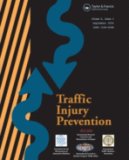3/30/2007
Study: Insurance Points Have Little Effect on BehaviorThe insurance industry makes millions on a license point that system that does little to deter speeding.

The practice of assigning license demerit points for traffic violations has little effect on reducing bad driving behavior according to a study published in this month's issue of the journal Traffic Injury Prevention. Researchers from the University of Maryland School of Medicine came to this conclusion after examining the driving records of 3.7 million motorists within the state from 2001 to 2003.
"Our findings indicate that a single speeding citation has limited effects on changing drivers' likelihood of receiving subsequent speeding citations," the researchers concluded. "Receiving fines and points had no significant impact on the risk of repeat citations, although this was the most severe penalty."
Maryland offers motorists accused of speeding two options. The easiest is to pay a fine by mail and suffer an increase in insurance premiums of anywhere from $25 to $1000 a year from license points. Judges also have the power to grant "probation before judgment" (PBJ) to motorists who show up at trial. This option allows the court to collect either a full or reduced fine without license points appearing on the motorist's record if no other violation is committed within a 6 to 12 month period.
Heavy lobbying from the insurance industry has pressured lawmakers into emphasizing the importance of license points. In Maryland, about 120,000 motorists receive points on their license each year. Assuming an average rate increase of just $100 per ticket, the insurance companies stand to make $36 million in additional profit for a single year's worth of ticketing, as violations remain on the record for three years.
The study found, however, that probation was significantly more effective than license points at preventing additional speeding. The 15,814 drivers who received a speeding ticket in May 2002 were twice as likely to receive another speeding ticket within the next year than the 3.7 million who were not ticketed in May. Yet the 4584 motorists who received probation in May were less likely to receive additional tickets than the 9527 who received license points.


